Atlantic Monthly Contributors's Blog, page 370
August 13, 2015
How Astronauts Watch the Perseid Meteor Shower

The Perseid meteor shower makes its annual appearance this week, and there’s plenty of stargazing guides available for how, where, and when to watch.
But some observers get a better look than most: the six people floating in space aboard the International Space Station, circling the Earth every 90 minutes.
Here’s the view NASA astronaut Scott Kelly had of the meteor shower, which peaked Wednesday night:
A photo posted by Scott Kelly (@stationcdrkelly) on Aug 12, 2015 at 9:33am PDT
And here it is in motion:
A video posted by NASA (@nasa) on Aug 12, 2015 at 6:29am PDT
Not too shabby.
The Perseid shower continues Thursday night. It occurs each summer, when Earth crosses paths with the comet Swift-Tuttle and the trail of dust and rock that follows it. When the tiny pieces of debris meet Earth’s atmosphere—at a whopping speed of 130,000 mph—they burn up, creating the dozens of shooting stars streaking across the night and early morning sky.









China’s Currency Falls for a Third Consecutive Day

China’s currency devaluation continued for a third day Thursday, as the country’s central bank set the official exchange rate of the renminbi against the U.S. dollar 1.1 percent lower than the day before. Since Tuesday, when the People’s Bank of China stunned markets by announcing the devaluation, the yuan has fallen 4.4 percent, triggering fluctuations in equity markets around the world.
The Chinese government has attempted to allay fears about the drop, claiming the fluctuation is the result of a policy shift designed to make the currency more market responsive. For the past decade, Beijing has established a “soft peg” of the renminbi against the dollar, allowing the currency to maneuver within 2 percentage points of a government-mandated figure. This shift will make the yuan eligible for consideration as a reserve currency, a status afforded to currencies such as the yen, dollar, and euro.
But other observers paint a less rosy picture. In addition to acceding to International Monetary Fund-mandated targets for currency internationalization, a weaker yuan will make Chinese exports cheaper and more competitive in global markets. The currency drop then, in effect, is a form of monetary stimulus. China’s gross domestic product is humming along at 7 percent, in line with goals set by the Chinese Communist Party. But the underlying data—such as real estate, construction, and logistics markets—suggest this figure may be artificially high.
The Chinese government has reassured global markets the currency drop is controlled and, most importantly, temporary. But the drop has nonetheless renewed concerns that it may cause a currency war. Here’s the Wall Street Journal’s Greg Ip:
While on the surface China has moved in the direction of market determination, it is surely not a coincidence that it came when markets were pushing the yuan in the direction the authorities consider essential for economic stimulus. This has the collateral benefit of leaving the Obama Administration tongue-tied. Since in principle the U.S. only wants the yuan to be market-determined, it can’t really complain if the result is that the yuan goes down instead of up.
The yuan’s fall continues a turbulent summer for the country’s economy. In July, Beijing launched drastic interventions to prop up stock markets in Shenzhen and Shanghai, which had fallen considerably after a lengthy bull run.









A Chinese City Recovers After Massive Explosions

Chinese President Xi Jinping is vowing Thursday a thorough investigation into the massive explosions in the port city of Tianjin. The death toll from Wednesday’s blasts has risen to at least 50, and the number of injuries has surpassed 700.
Among the dead were 17 firefighters who were battling the blaze, China’s official Xinhua news agency reported. Dozens of workers at the Tianjin Port Group Co. are still missing.
The explosion itself was dramatic, as can be seen in the video below:
The blasts occurred at a warehouse that stored “combustible and explosive goods.” The explosion destroyed cars and shipping containers in one of the world’s busiest ports, and its impact could be felt miles away.
Tianjin's environmental bureau said toxic fumes detected in the air after the explosions were within national standards, Xinhua added.









John Brennan’s Unsent Letter: ‘I Apologize for the Actions of CIA Officers’

When the CIA got caught spying on its Senate overseers, John Brennan, its director, at first defended the scandal-prone agency, dismissing the possibility of an act so unthinkable. Later, the CIA admitted breaking into computers being used by Senate intelligence committee staffers as they studied the agency’s brutal torture of prisoners. Two senators called on Brennan to resign. Others demanded a formal apology.
Now, newly released documents reveal that Brennan drafted a formal apology to Senators Dianne Feinstein and Saxby Chambliss, co-chairs of the intelligence committee.
“I apologize for the actions of CIA officers,” he wrote.
But Brennan never sent that letter. Instead, he sent a different draft with no apology. Jason Leopold of Vice News reports:
The draft apology letter Brennan wrote to Feinstein and Chambliss are two of more than 300 pages of documents VICE News obtained in response to a joint Freedom of Information Act lawsuit filed against the CIA with Ryan Shapiro, a historian and doctoral candidate at the Massachusetts Institute of Technology. We sued the CIA seeking a wide range of documents related to the allegations that the agency had spied on the Intelligence Committee and hacked into their computer network. While the CIA turned over some records, it also withheld thousands of pages, citing nearly every exemption under FOIA.
Here’s the best part:
After VICE News received the documents, the CIA contacted us and said Brennan's draft letter had been released by mistake. The agency asked that we refrain from posting it.
Notice the letter that the CIA meant to exclude didn’t contain any classified material or compromise any national-security secrets whatsoever. The public wasn’t going to be allowed to see it because the draft was embarrassing to people in power, even though it is plainly of interest to the press and to citizens engaged in self-governance. Meanwhile, as Feinstein told Leopold, “the CIA still has held no one responsible” for spying on the Senate, which ought to be reason enough for President Obama to fire its director. Perhaps Obama feels constrained by the fact that Brennan knows where the bodies aren’t buried by virtue of being intimately involved with virtually every drone strike of questionable legality that Obama has authorized. (It isn’t beyond the realm of possibility that a future Senate intelligence committee will attempt a 6,000 page report on crimes committed during the course of America’s drone war in Iraq, Afghanistan, Pakistan, Yemen, and Somalia.)
The newly released documents also raise questions about the competence of Brennan and the CIA. For those keeping score at home, the following incidents have all taken place during Obama’s tenure in office:
In 2011, Leon Panetta––the previous director of the CIA––“revealed the name of the Navy SEAL unit that carried out the Osama bin Laden raid and named the unit’s ground commander” in the presence of an uncleared Hollywood filmmaker. In 2012, John Brennan inadvertently “helped lead to disclosure of the secret at the heart of a joint U.S.-British-Saudi undercover counter-terrorism operation.” During the Senate intelligence committee’s torture investigation, the CIA, which desperately wanted to conceal Leon Panetta’s torture review from the Senate, incompetently made it available to them through a Google search function. And now they’ve accidentally released a draft letter that they intended to suppress.As salutary as I believe the last two of those errors to be, the overall pattern suggests a national security establishment that is terrible at guarding legitimate and illegitimate secrets alike, even as it vigorously prosecutes breaches of the classification system in order to punish whistleblowers. Perhaps Brennan sent the wrong letter when he apologized, too.









August 12, 2015
The 2016 U.S. Presidential Race: A Cheat Sheet

For campaign-finance reform enthusiasts, Lawrence Lessig is more. The Harvard law professor and electoral-reform activist announced on Tuesday that he’s weighing a bid for the Democratic nomination for president. If he joins the race, Lessig would campaign with a simple platform: remove the influence of money from politics. It’s a familiar refrain among Democrats, including Bernie Sanders and Hillary Clinton, but Lessig’s devotion to the cause stands out.
Ironically, the best spokesman for campaign-finance reform in the race right now might be the richest one. When asked about donations to Democratic candidates during the first GOP primary debate, Donald Trump admitted he was buying influence. “When they call, I give,” he told the crowd. “And you know what? When I need something from them—two years later, three years later—I call them. They are there for me. And that's a broken system.” On that, if nothing else, Tump and Lessig would likely agree.
With so many candidates in the mix—some announced, some soon to announce, and some still on the fence—it’s tough to keep track of it all. To help out with that, this cheat sheet on the state of the presidential field will be periodically updated throughout the campaign season. Here's how things look right now.
* * *
The Democrats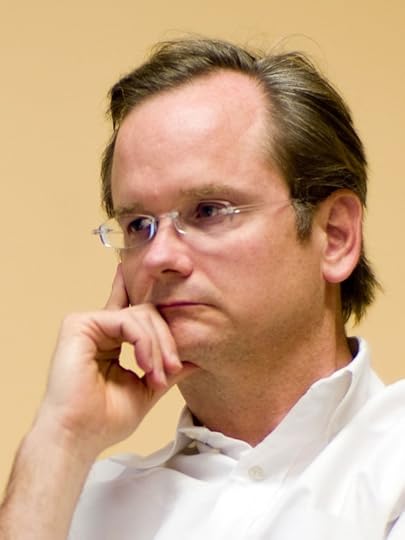 Wikimedia Lawrence Lessig
Wikimedia Lawrence Lessig Who is he? Lessig is a professor at Harvard Law School, political activist, and occasional Atlantic contributor. Among the causes he’s backed are campaign-finance reform, reversing the Citizens United decision, and loosening copyright restrictions. He’s also proposed calling a second constitutional convention to modernize the nation's founding document.
Is he running? He announced an exploratory committee on August 11 and pledged to enter the race if he raises $1 million by Labor Day.
Who wants him to run? Proponents of electoral reform, presumably. Lessig is pitching himself as a “referendum president” whose sole purpose would be to pass his proposed Citizens Equality Act of 2017. The bill would enact universal voting registration, campaign-finance limits, and anti-gerrymandering provisions.
Can he win the nomination? If Donald Trump has proven anything by ascending to frontrunner status, it's that anything is possible.
What else do we know? In a season 6 episode of The West Wing, a fictional Lessig (played by Christopher Lloyd) worked with the White House to write a new constitution for Belarus.
Does his website have a good 404 page? No.
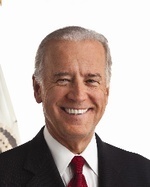 Wikimedia Joe Biden
Wikimedia Joe Biden Who is he? Biden is vice president and the foremost American advocate for aviator sunglasses and passenger rail.
Is he running? Biden hasn’t taken any visible steps toward building the organizing or fundraising infrastructure necessary for mounting a presidential run, but Maureen Dowd reported in The New York Times on August 2 that the vice president has been edging toward a campaign since the death of his son Beau in May.
Who wants him to run? The Wall Street Journal reports that both Beau Biden and his brother Hunter encouraged their father to run. The group Draft Biden (slogan: “I’m Ridin’ With Biden”) continues to do its best.
Can he win the nomination? Even with Clinton's recent struggles, it's hard to imagine Biden beating her in a primary. At 72, Biden would also be an unusually elderly candidate.
When will he announce? Biden will make a decision by early September, according to the Times.
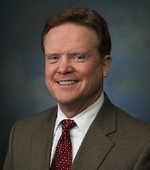 Wikimedia
Jim Webb
Wikimedia
Jim Webb
Who is he? Webb is a Vietnam War hero and secretary of the Navy. The author of several books, he served as a senator from Virginia from 2007 to 2013.
Is he running? Yes, as of July 2.
Who wants him to run? Dovish Democrats; socially conservative, economically populist Democrats; the Anybody-But-Hillary camp.
Can he win the nomination? Very doubtful. While Webb was the perfect candidate for Senate from Virginia in 2006, his statement in support of the Confederate flag shows why he probably has little hope in the national Democratic Party.
What else do we know? Read Webb’s longtime friend James Fallows on why he wants Webb in the race.
Does his website have a good 404 page? No.
 Wikimedia
Hillary Clinton
Wikimedia
Hillary Clinton
Who is she? As if we have to tell you, but: She’s a trained attorney; former secretary of State in the Obama administration; former senator from New York; and former first lady.
Is she running? Yes.
Who wants her to run? Most of the Democratic Party.
Can she win the nomination? A better question is whether she can lose it. Not yet!
What else do we know? The real puzzler, after so many years with Clinton on the national scene, is what we don't know. Here are 10 central questions to ask about the Hillary Clinton campaign.
Does her website have a good 404 page? If you’re tolerant of bad puns and ’90s ’80s outfits, the answer is yes.
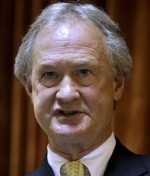 Steven Senne / AP
Lincoln Chafee
Steven Senne / AP
Lincoln Chafee
Who is he? The son of beloved Rhode Island politician John Chafee, Linc took his late father’s seat in the U.S. Senate, serving as a Republican. He was governor, first as an independent and then as a Democrat.
Is he running? Yes—he announced his run at George Mason University on June 3.
Who wants him to run? Beyond metric-system boosters? No one knows! Even in Rhode Island, Chafee doesn’t have much support—he opted not to seek re-election as governor in 2014, in part because his approval rating had reached a dismal 26 percent.
Can he win the nomination? No. Chafee seems to be positioning himself as an economic populist and says Clinton's 2002 vote for the Iraq war should disqualify her (he was the only Republican senator to vote against it). In other words: He's Jim Webb with a less impressive resume, a less compelling bio (he's the son of longtime Senator John Chafee), and less of a political base. He gives himself even odds, though.
Does his website have a good 404 page? No.
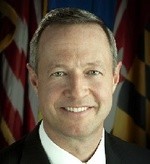 Wikimedia
Martin O'Malley
Wikimedia
Martin O'Malley
Who is he? He’s a former governor of Maryland and mayor of Baltimore.
Is he running? Yes. He announced his campaign on May 30.
Who wants him to run? Not clear. He has some of the leftism of Bernie Sanders or Elizabeth Warren, but without the same grassroots excitement.
Can he win the nomination? Probably not. At the moment, O’Malley seems caught between Sanders, who has grasped the progressive mantle, and Clinton, who dominates the Democratic race overall. As with Sanders, though, it’s hard to see where O'Malley would get an opening unless Clinton’s campaign fell apart. The conventional wisdom since protests over the death of Freddie Gray is that protests in Baltimore undermine the case for his candidacy and make it harder for him to run, but he’s embraced the protests as a motivation for his run.
What else do we know? Have you heard that he plays in a Celtic rock band? You have? Oh.
Does his website have a good 404 page? No.
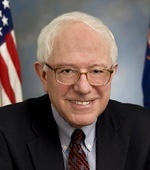 Wikimedia
Bernie Sanders
Wikimedia
Bernie Sanders
Who is he? A self-professed socialist, Sanders represented Vermont in the U.S. House from 1991 to 2007, when he won a seat in the Senate.
Is he running? Yes. He announced April 30.
Who wants him to run? Far-left Democrats; socialists; Brooklyn-accent aficionados.
Can he win the nomination? It remains extremely difficult to see him winning the nomination, on the basis that primary voters tend to gravitate to “electable” general-election candidates alone. But Sanders has improbably become a huge force in the Democratic Party, making questions about inequality and economics central to the campaign and tugging Hillary Clinton to the left.
Does his website have a good 404 page? Yes, and it is quintessentially Sanders.
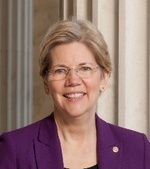 Wikimedia
Elizabeth Warren
Wikimedia
Elizabeth Warren
Who is she? Warren has taken an improbable path from Oklahoma, to Harvard Law School, to progressive heartthrob, to Massachusetts senator.
Is she running? No. Seriously, no.
Who wants her to run? Progressive Democrats; economic populists, disaffected Obamans, disaffected Bushites.
Can she win the nomination? No, because she's not running.
* * *
The Republicans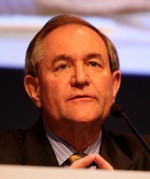 Gage Skidmore
Gage Skidmore Jim Gilmore
Who is he? Right? Gilmore was governor of Virginia from 1998 to 2002. Before that, he chaired the Republican National Committee for a year. In 2008, he ran for Senate in Virginia and lost to Mark Warner by 31 points. Thirty-one!
Is he running? Yes. He filed his papers on July 29.
Who wants him to run? Who knows? Gilmore ran for president briefly during the 2008 cycle before switching to the Senate race. There’s not exactly a groundswell for him this time, either. He says he has experience with national security and the economy that other Republican candidates don’t, and if he’s talking about Trump, it’s hard to disagree.
Can he win? Nah.
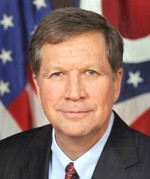 Wikimedia
Wikimedia John Kasich
Who is he? The current Ohio governor ran once before, in 2000, after a stint as Republican budget guru in the House. Between then and his election in 2010, he worked at Lehman Brothers. Molly Ball wrote a definitive profile in April.
Is he running? Yes: His announcement was July 21 at Ohio State University in Columbus.
Who wants him to run? Kasich’s pitch: He’s got better fiscal-conservative bona fides than any other candidate in the race, he’s proven he can win blue-collar voters, and he’s won twice in a crucial swing state. While his polling isn’t stellar, he still leads Graham, Fiorina, and Jindal.
Can he win the nomination? As Ball noted, Kasich seems in some ways perfectly suited to this race; in other ways, his insistent anti-charisma makes it very hard to imagine him winning, and his attitude is amusingly blasé: “If they like it, great. If they don’t like it, I’ll play more golf.” He could be hurt by his embrace of Medicaid expansion under Obamacare, a move he had to circumvent the Republican-led General Assembly to make.
Does his website have a good 404 page? Nope.
What else do we know? John Kasich bought a Roots CD and hated it so much he threw it out of his car window. (Littering is illegal, governor!) John Kasich hated the Coen brothers’ classic Fargo so much he tried to get his local Blockbuster to quit renting it. George Will laughed at him. John Kasich is the Bill Brasky of philistinism. John Kasich probably hated that skit, too.
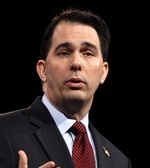 Gage Skidmore
Gage Skidmore Scott Walker
Who is he? Elected governor of Wisconsin in 2010, Walker earned conservative love and liberal hate for his anti-union policies. In 2013, he defeated a recall effort, and he won reelection the following year.
Is he running? Yes. He announced on July 13.
Who wants him to run? Walker's record as governor of Wisconsin excites many Republicans. He's got a solid résumé as a small-government conservative. His social-conservative credentials are also strong, but without the culture-warrior baggage that sometimes brings. And Walker has won three difficult elections in a blue-ish state. He’s said to be a favorite of the Koch brothers and their network.
Can he win the nomination? Very possibly. Despite his strengths, Walker has never run a national campaign and isn't exactly Mr. Personality. For now, he is solidly in the top tier of candidates.
Does his website have a good 404 page? Aye, matey.
What else do we know? Good news, bad news: Walker has a geographic advantage in his proximity to Iowa, but a potential biological disadvantage from his allergy to dogs.
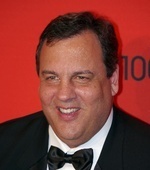 David Shankbone
David Shankbone Chris Christie
Who is he? What’s it to you, buddy? The combative New Jerseyan is in his second term as governor and previously served as a U.S. attorney.
Is he running? Christie kicked off his campaign June 30 at Livingston High School, his alma mater.
Who wants him to run? Moderate and establishment Republicans who don't like Bush or Romney; big businessmen, led by Home Depot founder Ken Langone.
Can he win the nomination? No. The tide of opinion had turned against Christie even before the "Bridgegate" indictments. Citing his horrific favorability numbers, FiveThirtyEight bluntly puns that “Christie's access lanes to the GOP nomination are closed.”
Does his website have a good 404 page? We would have gone with the GIF, but sure.
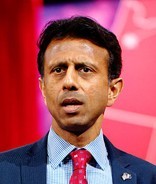 Gage Skidmore
Gage Skidmore Bobby Jindal
Who is he? A Rhodes Scholar, he’s the outgoing governor of Louisiana. He previously served in the U.S. House.
Is he running? Yes. He kicked off his campaign on June 24.
Who wants him to run? It’s hard to say. Jindal has assiduously courted conservative Christians, both with a powerful conversion story (he was raised Hindu but converted to Catholicism in high school) and policies (after other governors reversed course, he charged forward with a religious-freedom law). But he still trails other social conservatives like Ted Cruz and Mike Huckabee.
Can he win the nomination? Probably not. Jindal still lacks traction at the national level, he faces an overcrowded field of social conservatives, and his stewardship of the state of Louisiana has come in for harsh criticism even from staunch fiscal conservatives. It’s hard to see how he gains momentum from here.
What else do we know? In 1994, he wrote an article called “Physical Dimensions of Spiritual Warfare,” in which he described a friend’s apparent exorcism.
Does his website have a good 404 page? Meh. Good joke, but past its expiration date.
 Gage Skidmore
Gage Skidmore Donald Trump
Who is he? The real-estate developer and reality-TV star fired TV personality almost certainly isn’t worth as much as he wants you to think he is.
Is he running? Like, is he going to win the nomination? Of course not. But his wacky, offensive, ad-lib rise to the top of the Republican polls has been amazing.
Who wants him to run? Jon Stewart; Donald Trump. The rest of the Republican Party, however, seems horrified.
Can he win the nomination? When does this GIF stop seeming funny and accurate, and start seeming incorrect?

Not today! He’s still not gonna win.
What else do we know? He’s, like, a really smart person.
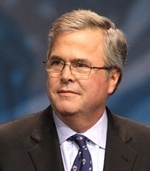 Gage Skidmore
Gage Skidmore Jeb Bush
Who is he? The brother and son of presidents, he served two terms as governor of Florida, from 1999 to 2007.
Is he running? Yes, as of June 15.
Who wants him to run? Establishment Republicans; George W. Bush; major Wall Street donors.
Can he win the nomination? Bush is a top-tier candidate, but just how strong he is remains unclear. Since jumping into the race, he has continued to poll well and raise lots of money. He seems like a lock to rack up all-important endorsements from top Republicans. But predictions that he would quickly come to dominate the field have not come to pass, and while many analysts predicted that his moderate record would cause trouble in Iowa and with grassroots activists, that problem seems to be deeper than expected. His poll numbers are probably helped by his name, which is a double-edged sword.
What else do we know? Since Bush's surprise announcement, he has tended to stay fairly quiet, delivering some big speeches and hitting fundraisers, but not making a great number of trips to Iowa or New Hampshire.
Does his website have a good 404 page? Yes—y en español también.
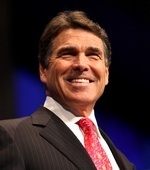 Gage Skidmore
Gage Skidmore Rick Perry
Who is he? George W. Bush’s successor as governor of Texas, he entered the 2012 race with high expectations, but sputtered out quickly. He left office in 2014 as the Lone Star State’s longest-serving governor.
Is he running? Yes. He announced on June 4.
Who wants him to run? Small-government conservatives; Texans; immigration hardliners; foreign-policy hawks. Noah Rothman makes a case here. (Perry's top backer four years ago, non-relative Bob Perry, died in 2013.)
Can he win the nomination? Perry and his backers insist 2016 Perry will be the straight shooter who oversaw the so-called Texas miracle, not the meandering, spacey Perry of 2012. We'll see. So far, his campaign has failed to catch on in polling, even as he wins acclaim as a drastically improved candidate.
Does his website have a good 404 page? That depends. Is this an “oops” joke? If so, yes.
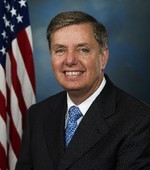 Wikimedia
Wikimedia Lindsey Graham
Who is he? A senator from South Carolina, he’s John McCain’s closest ally in the small caucus of Republicans who are moderate on many issues but very hawkish on foreign policy.
Is he running? He sure is. Graham kicked off the campaign June 1.
Who wants him to run? John McCain, naturally. Senator Kelly Ayotte, possibly. Joe Lieberman, maybe?
Can he win the nomination? Not really. The South Carolina senator seems to be running in large part to make sure there’s a credible, hawkish voice in the primary. It seems like Graham started his campaign almost as a lark but has started to enjoy the ride, plus he’s shown he’s a great performer on the stump. Molly Ball explores his chances at greater length here.
What else do we know? Graham promises to have a rotating first lady if he wins. We nominate Lana del Ray.
 Michael Vadon
Michael Vadon George Pataki
Who is he? Pataki ousted incumbent Mario Cuomo in 1994 and served three terms as governor of New York.
Is he running? Yes. He announced May 28.
Who wants him to run? It's not clear. Establishment Northeastern Republicans once held significant sway over the party, but those days have long since passed.
Can he win the nomination? No. As my colleague Russell Berman previously noted, Pataki is one of the longest of the long-shot GOP candidates. He has touted his leadership on 9/11, when he served as governor, but so did former New York City Mayor Rudy Giuliani. He was also a successful conservative governor in a deep-blue Northeastern state, but so was former Massachusetts Governor Mitt Romney. He seems to be socially liberal enough to alienate primary voters, but not enough to capture Democrats.
Does his website have a good 404 page? No.
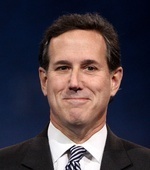 Gage Skidmore
Gage Skidmore Rick Santorum
Who is he? Santorum represented Pennsylvania in the Senate from 1995 until his defeat in 2006. He was the runner-up for the GOP nomination in 2012.
Is he running? Yes, with a formal announcement on May 27.
Who wants him to run? Social conservatives. The former Pennsylvania senator didn't have an obvious constituency in 2012, yet he still went a long way, and Foster Friess, who bankrolled much of Santorum's campaign then, is ready for another round.
Can he win the nomination? It's tough to imagine. Santorum himself said his chances would hinge on avoiding saying "crazy stuff that doesn't have anything to do with anything." For now, his poll numbers remain in the basement—but he surprised in 2012.
Does his website have a good 404 page? No.
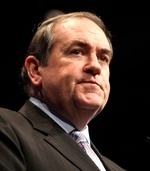 Gage Skidmore
Gage Skidmore Mike Huckabee
Who is he? An ordained preacher, former governor of Arkansas, and Fox News host, he ran a strong campaign in 2008, finishing third, but sat out 2012.
Is he running? Yes. He kicked off the campaign May 5.
Who wants him to run? Social conservatives; evangelical Christians.
Can he win the nomination? Huckabee's struggle will be to prove that he's still relevant. Since he last ran in 2008, a new breed of social conservatives has come in, and he'll have to compete with candidates like Ted Cruz. His brand of moral crusading feels a bit out of date in an era of widespread gay marriage—not least when he curiously chose to attack Beyoncé. (His statements in support of Josh Duggar have also earned him criticism and quizzical reaction.) He faces fire from strict anti-tax conservative groups for tax hikes while he was governor. And fundraising has always been his weak suit. But Huckabee's combination of affable demeanor and strong conservatism resonates with voters.
Does his website have a good 404 page? It’s pretty good.
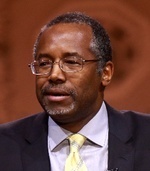 Gage Skidmore
Gage Skidmore Ben Carson
Who is he? A celebrated former head of pediatric neurosurgery at Johns Hopkins, Carson became a conservative folk hero after a broadside against Obamacare at the 2013 National Prayer Breakfast.
Is he running? Yes, after a May 4 announcement.
Who wants him to run? Grassroots conservatives, who have boosted him up near the top of polls, even as Republican insiders cringe. Carson has an incredibly appealing personal story—a voyage from poverty to pathbreaking neurosurgery—and none of the taint of politics.
Can he win the nomination? Almost certainly not. Carson's politics are conservative on some issues, but so eclectic as to be nearly incoherent overall. He's never run a political campaign, and has a tendency to do things like compare ISIS to the Founding Fathers. Despite initially building a formidable organization, he’s struggled to keep it together, with a rash of top staffers defecting.
Does his website have a good 404 page? No.
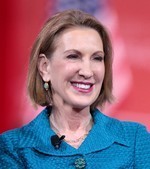 Gage Skidmore
Gage Skidmore Carly Fiorina
Who is she? Fiorina rose through the ranks to become CEO of Hewlett-Packard from 1999 to 2005, before being ousted in an acrimonious struggle. She advised John McCain’s 2008 presidential campaign and unsuccessfully challenged Senator Barbara Boxer of California in 2010.
Is she running? Yes, as of a May 4 announcement.
Who wants her to run? It isn’t clear what Fiorina’s constituency is. She’s a former CEO of Hewlett-Packard, but there are other business-friendly candidates in the race, all of whom have more electoral experience.
Can she win the nomination? Almost certainly not. Fiorina’s only previously political experience was a failed Senate campaign against Barbara Boxer in 2010. She has mostly been serving the role of harasser in the race so far, stirring up the news with slams on environmentalists for causing droughts (your guess is as good as mine), Obama for backing net neutrality, and Apple’s Tim Cook for speaking out on Indiana’s Religious Freedom Restoration Act. Mainly, though, she has strongly criticized Hillary Clinton, and some Republican strategists like the optics of having a woman to criticize Clinton so as to sidestep charges of sexism. Fiorina seems to be wowing voters in Iowa, but that hasn’t translated into national support—yet.
What else do we know? Fiorina's 2010 Senate race produced two of the most entertaining and wacky political ads ever, "Demon Sheep" and the nearly eight-minute epic commonly known as "The Boxer Blimp."
Does her website have a good 404 page? No.
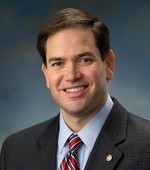 Wikimedia
Wikimedia Marco Rubio
Who is he? A second-generation Cuban-American and former speaker of the Florida House, Rubio was catapulted to national fame in the 2010 Senate election, after he unexpected upset Governor Charlie Crist to win the GOP nomination.
Is he running? Yes—he announced on April 13.
Who wants him to run? Rubio enjoys establishment support, and has sought to position himself as the candidate of an interventionist foreign policy.
Could he win the nomination? Charles Krauthammer pegs him as the Republican frontrunner. His best hope seems to be to emerge as a consensus candidate who can appeal to social conservatives and hawks, and he's even sounded some libertarian notes of late. He's well-liked by Republicans, and has surged forward since announcing, but he needs to move up from second choice to first choice for more of them. Rubio seems to scare Democrats more than any other candidate, too.
Does his website have a good 404 page? It’s decent.
 Wikimedia
Wikimedia Rand Paul
Who is he? An ophthalmologist and son of libertarian icon Ron Paul, he rode the 2010 Republican wave to the Senate, representing Kentucky.
Is he running? Yes, as of April 7.
Who wants him to run? Ron Paul fans; Tea Partiers; libertarians; civil libertarians; non-interventionist Republicans.
Can he win the nomination? At one time, Paul seemed like he might manage to break into the top tier despite being a radically unorthodox Republican. He's relatively permissive on drugs, passionate about civil liberties, and adamantly in favor of restraint on foreign policy. So far, however, his unusual candidacy isn’t taking off. Paul remains stuck in the rear-middle of the pack, he hasn’t picked up the big donors he hoped for, and his father’s backers remain wary of his overtures to the GOP establishment
What else do we know? One of Paul's greatest strengths is the base bequeathed to him by his father, three-time presidential candidate and former Representative Ron Paul. But as The Washington Post has reported, his father is also Senator Paul's biggest headache.
Does his website have a good 404 page? No.
 Wikimedia
Wikimedia Ted Cruz
Who is he? Cruz served as deputy assistant attorney general in the George W. Bush administration and was appointed Texas solicitor general in 2003. In 2012, he ran an insurgent campaign to beat a heavily favored establishment Republican for Senate.
Is he running? Yes. He launched his campaign March 23 at Liberty University in Virginia.
Who wants him to run? Hardcore conservatives; Tea Partiers who worry that Rand Paul is too dovish on foreign policy; social conservatives.
Can he win the nomination? Though his announcement gave Cruz both a monetary and visibility boost, he still carries serious weaknesses. Much of Cruz's appeal to his supporters—his outspoken stances and his willingness to thumb his nose at his own party—also imperil him in a primary or general election, and he's sometimes been is own worst enemy when it comes to strategy. But Cruz is familiar with running and winning as an underdog.
Does his website have a good 404 page? No.
 Gage Skidmore
Gage Skidmore Sarah Palin
Who is she? If you have to ask now, you must not have been around in 2008. That’s when John McCain selected the then-unknown Alaska governor as his running mate. After the ticket lost, she resigned her term early and became a television personality.
Is she running? A bizarre speech in January made a compelling case both ways.
Who wants her to run? Palin still has diehard grassroots fans, but there are fewer than ever.
Can she win the nomination? No.
When will she announce? It doesn't matter.
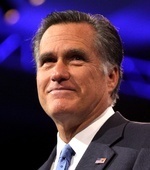 Gage Skidmore
Gage Skidmore Mitt Romney
Who is he? The Republican nominee in 2012 was also governor of Massachusetts and a successful businessman.
Is he running? Nah. He announced in late January that he would step aside.
Who wanted him to run? Former staffers; prominent Mormons; Hillary Clinton's team. Romney polled well, but it's hard to tell what his base would have been. Republican voters weren't exactly ecstatic about him in 2012, and that was before he ran a listless, unsuccessful campaign. Party leaders and past donors were skeptical at best of a third try.
Could he have won the nomination? He proved the answer was yes, but it didn't seem likely to happen again.
 Gage Skidmore John Bolton
Gage Skidmore John Bolton Who is he? A strident critic of the UN and leading hawk, he was George W. Bush’s ambassador to the UN for 17 months.
Is he running? Nope. After announcing his announcement, in the style of the big-time candidates, he posted on Facebook that he wasn’t running.
Who wanted him to run? Even among super-hawks, he didn’t seem to be a popular pick, likely because he had no political experience.
Could he have won the nomination? They say anything is possible in politics, but this would test the rule. A likelier outcome could be a plum foreign-policy role in a hawkish GOP presidency.









Jimmy Carter's Cancer Diagnosis
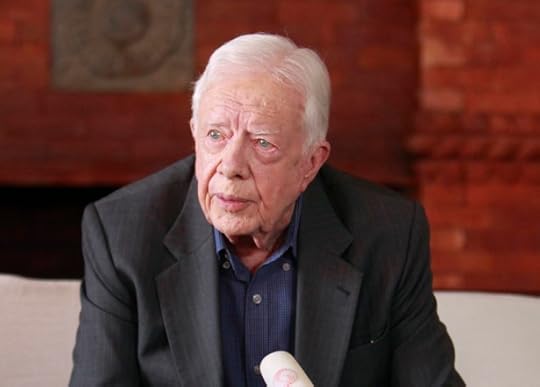
Former President Jimmy Carter said Wednesday that he has cancer.
“Recent liver surgery revealed that I have cancer that now is in other parts of my body,” he wrote in a statement posted on the Carter Center’s website.
Carter, who is 90, had surgery to remove a “small mass” from his liver, The Associated Press reported. He said Wednesday that he “will be rearranging my schedule as necessary” to receive treatment for the disease from Emory HealthCare, a hospital system in Atlanta. A longer statement about his health will come “when facts are known,” perhaps next week, Carter said.
A Carter Center spokeswoman told the AP that the former president’s “prognosis is excellent for a full recovery.”
Carter told The New York Times in 2007 that he once received regular CT scans to detect lesions on his pancreas. Carter’s father, mother, brother and sisters all died of pancreatic cancer. The former president described the health screenings to the Times back then:
“I don’t get any more M.R.I.’s or CT scans regularly,” he said. “I do have extensive blood work. I get a thorough physical exam once a year, and a fairly good physical exam twice a year. They do ultrasound on my body, too. But I don’t get too involved in cross-examining the doctor. They’re so thorough at Emory University.”
Carter said doctors were stumped about the prevalence of the cancer in his family. More:
“Nobody knew,” he said. “They thought my family might have imbibed some kind of poison, a pesticide. Back in the olden days, the federal government didn’t care what kind of poison you used.”
Carter has remained active since he left the Oval Office in 1981, working on humanitarian projects through his eponymous nonprofit center. He described his work to John Meroney last month in an interview with The Atlantic:
For the people who don’t have peace, we negotiate agreements that end wars and prevent wars. We promote democracy and freedom by holding elections in troubled countries—in fact, we just finished our one-hundredth election. This year, we’ll treat about 71 million people, mostly in Africa, so they won’t have terrible diseases. That’s been the concentration of my effort ever since I left the White House.
President Obama on Wednesday wished Carter a fast recovery. “Jimmy, you're as resilient as they come, and along with the rest of America, we are rooting for you,” the president said in a statement.









A Massive Explosion Rocks a Chinese City
At least one massive explosion late Wednesday rocked the Chinese port city of Tianjin, injuring dozens of people.
China's state-run People's Daily attributed the blast to “combustible and explosive goods” at the city’s container terminal. The newspaper’s website said the injured had been taken to hospital, but there was no official casualty count.
It later added that China’s Earthquake Network Center measured two blasts, 30 seconds apart.
CCTV-America, the U.S. arm of the Chinese state-run broadcaster, added:
The National Business Daily newspaper also reported that two firefighters battling the blaze are missing and six are slightly wounded. Six fire brigades are on the scene and the fire is nearly out. The newspaper also reported that 300-400 people are wounded.
Xinhua, the official news agency, said the fire caused by the explosion was “under control.”
We will update this post with more details as they become available.








Hide Your Fires: On Shakespeare and the ‘Noted Weed’

The Internet has been aflame in recent days over the question of whether William Shakespeare, the most venerated figure in the English language, liked to get high. Media outlets on both sides of the Atlantic jumped on forensic analysis of pipes from Shakespeare’s garden, with many taking irreverent delight in how they reported the news that the Bard of Avon may have smoked marijuana. People were so excited about the news, in fact, that they failed to notice that it wasn’t news at all—but merely a resurrection of a study from 2001. This isn’t even the first time that the media has revived this story—the study led to several articles back in 2011 as well. But the episode is emblematic of a larger issue: the huge discrepancy between public adulation of Shakespeare and historical knowledge of the man himself, and the desire of many to fill that void.
Related Story
The study in question, from the South African researcher Dr. Francis Thackeray and his colleagues, certainly warrants public interest. Thackeray, an anthropologist, told me he was inspired to investigate whether Shakespeare enjoyed marijuana while reading the author’s poems—specifically Sonnet 76, which contains the verse, “Why write I still all one, ever the same/ And keep invention in a noted weed,” as well as a reference to “compounds strange.” Thackeray and his team analyzed 24 pipe fragments from in and around Stratford-upon-Avon, including several from Shakespeare’s birthplace and the home he owned later in his life at New Place. The tests found strong evidence for use of nicotine and, more surprisingly, cocaine—a fascinating discovery for anyone interested in the consumption habits of Elizabethan England.
Evidence for marijuana was less substantive. The 2001 study states that “unequivocal evidence for cannabis has not been obtained.” The researchers did detect mass-to-charge ratios of compounds that were indicative of compounds derived from marijuana, but not in quantities sufficient for proof. The study argues that the lack of evidence may be “associated with the effects of heating, and problems in identifying traces of cannabinoids in old samples,” but ultimately concludes that “the results are suggestive but do not prove the presence of cannabis.” Thackeray told me that he has since revisited the data and believes the evidence for cannabis to be more substantial than before, but this apparently strengthened evidence is not seen in any new reports.
Stories like these continue to seize the public’s imagination because there’s still so much we don’t know about one of the most studied figures in history.Aside from the lack of any conclusive proof for presence of marijuana, it’s even harder to tie the pipes directly to Shakespeare himself. They have been dated only according to their size and dimensions—the study says that they “probably date to the 17th century.” (Shakespeare died in 1616, for reference.) The provenance of the fragments does little better, as scholars can’t say how much time Shakespeare actually spent at his final home of New Place, and his birthplace became an inn in the early 17th century. Short of digging up Shakespeare’s body and putting it through chemical testing (and Thackeray has proposed doing just that in the past), there’s slim evidence to indicate that Shakespeare was a stoner.
Stories like these continue to seize the public’s imagination because there’s still so little information about one of the most studied figures in history. Michael Witmore, the director of the Folger Shakespeare Library in Washington, D.C., gave me the rundown of what is known about the Bard: He was born in Stratford-upon Avon; he moved to London and had a successful career as a poet, actor, and playwright; and he eventually retired from the London stage and returned to Stratford, where he bought a home for himself and his family. And yet there’s little information about his educational background, and there are a whole seven years of his life—between the birth of his twin children and his arrival in London—for which there are no records whatsoever.
It’s no wonder then that new claims about Shakespeare’s life draw so much attention. Take, for instance, the alleged discovery of Shakespeare’s dictionary by two New York booksellers, which prompted a piece in The New Yorker questioning the collective hunger for relics tied to the playwright. Articles from earlier this year reported on the claim that a likeness of Shakespeare had been discovered in a late-16th-century botanical book, and still others puzzled over several different portraits purported to depict the “real” Shakespeare. And that’s without even delving into articles about whether Shakespeare was a secret Catholic, or gay, or hey, did he even write any of those plays?
Many of these discoveries and theories end up being either debunked or disregarded by Shakespeare scholars, mainly because they fail to fulfill the very specific criteria these scholars require to verify authenticity. “The standard is very high with a new ‘discovery’ about Shakespeare,” Witmore said, “and it is that we should feel that it is unreasonable to doubt the assertion.” That is, scholars must be able to discount all other alternative explanations for the discovery before they can agree that it’s attributable to the Bard. Witmore and his colleague, Heather Wolfe, actually provide a thorough overview of the painstaking verification steps Shakespeare scholars must take in their response to the discovery of the dictionary. Unfortunately, what don’t receive the same degree of public attention are the new discoveries that scholars have verified, among them being the fact that Shakespeare may have had a co-author on up to a third of his plays, according to Witmore.
Just because most Shakespeare discoveries tend to be unverifiable doesn’t mean that future announcements of new findings will be greeted with any less enthusiasm. “It is startling that anyone could have written so creatively for so long, and that a set of works would continue to speak to people and be adapted from one language and place in time to another,” Witmore said. “I think that is fundamentally difficult to explain, and in a way it’s both inspiring and, as an achievement, mystifying, which is why we still have questions.” Next year marks the 400th anniversary of Shakespeare’s death, meaning surely the analysis is just beginning.









A Troubling Execution in North Korea

The Internet had fun Tuesday at the expense of Tinder, whose social-media team did not take kindly to a recent Vanity Fair profile of the online dating app. In one of a series of tweets, Tinder claimed users in China and North Korea used the service though both countries ban Facebook, which Tinder requires in order to sign up.
In North Korea, so few people have access to the Internet that a joke spread saying Kim Jong Un, the country’s youthful leader, must be the one swiping right. But the portly dictator apparently has more important considerations on his mind. On Wednesday, South Korea’s Yonhap News Service reported that Choe Yong-gon, one of North Korea’s vice premiers, was killed in May under direct orders from the leader. Choe, last seen in public in December, was a key official who represented North Korea in trade talks with the South in the mid-2000s.
Confirming news events in North Korea—whose government rarely publicizes the deaths of key officials—is an inexact science. But if confirmed, Yong-gon would be one of more than 70 North Korean government officials to lose his life after Kim assumed control of the country following his father’s death in 2011. Most notably, in 2013 Kim had Jang Song Thaek, his uncle and the country’s second-most powerful official, killed following suspicions Jang was plotting a coup. Others have met their demise after offenses that are almost comically minor. In April, Defense Minister Hyon Yong Chol was reportedly killed after falling asleep while Kim was delivering a speech. Choe, meanwhile, attracted Kim’s ire for questioning the leader’s forestry policies.
North Korea has been a police state since its inception in 1945, and official purges are a necessary byproduct of the country’s political system. But their acceleration under Kim has sparked fear the “hermit kingdom” is enduring a period of relative political instability. Unlike his father, who was designated Kim Il Sung’s successor 14 years before assuming office, the relatively unknown Kim Jong Un was thrust into power following a brief stint in the public eye. Having inherited his father’s government, Kim has set about reshaping North Korea’s leadership in his own image: In the first two years of his reign, he has replaced half of the country’s 218 top officials.
In many ways, North Korea is a more open society than it was in the 1990s, when a devastating famine claimed as many as 2.5 million lives. While all but the country’s elite lack access to the Internet, cross-border flows with China have brought ordinary North Korean in closer contact with the outside world. Traders have smuggled in smartphones that, while disconnected from the Internet, at least provide North Koreans with an idea of how their neighbors in China and South Korea live. The information blockages that once thoroughly isolated the populations have lifted, if just a bit.
Nevertheless, in diplomatic terms North Korea is as isolated as ever, and the country still struggles to meet the basic needs of its 25 million citizens. It is suffering from its worst drought in nearly a century, and close to a third of the country’s rice paddies have dried up. Imagining a North Korea in which people have access to services like Tinder may not be so far-fetched—but a North Korea where top officials don’t suddenly vanish still seems further off.









Why Pearson Sold Its Stake in The Economist

The British company Pearson announced Wednesday it is selling its 50 percent stake in the company that owns The Economist magazine to the group’s other shareholders for about $730 million. The move comes a month after the education company sold the Financial Times to Japan’s Nikkei newspaper for $1.3 billion.
Pearson’s stake is being bought, in part, by Italian company Exor—the holding company of the Agnelli family, founders of Italian carmaker Fiat. Exor will pay about $446 million for the group’s shares, increasing its stake from 4.7 percent to 43.4 percent, the Italian company said.
The rest of Pearson’s stake will be bought by the Economist Group for $284.7 million.
Pearson’s sale of The Economist allows it to focus on its educational properties, though it still holds a 47 percent stake in Penguin Random House, the publishing firm.
In a statement announcing the sale, John Fallon, Pearson’s chief executive, said the company “is proud to have been a part of the Economist’s success over the past 58 years, and our shareholders have benefited greatly from its growth.”
Rupert Pennant-Rea, the chairman of The Economist Group, said in a separate statement that with Pearson’s decision to sell, “the board’s priority was to secure the independence of the ownership of the Group and the continued editorial independence of The Economist.”
The New York Times adds that Exor’s increased stake will not increase its influence within the group. Here’s more:
That is because of a complicated trust structure that essentially ensures that the Economist Group cannot be taken over by owners eager to impose their own interests.
The London-based Economist Group owns The Economist magazine—which has been published since 1843—as well as the Economist Intelligence Unit, a data arm, and CQ Roll Call.
The group is one of those rare media entities: one that is not only widely respected, but also makes money. Although it is privately held, the company releases its financial record in March. According to its most recent results, the company had an operating profit of about $93.8 million, up 2 percent for the year. The weekly magazine’s circulation was 1.6 million, and the company saw a 13 percent increase in gross profit from circulation.









Atlantic Monthly Contributors's Blog
- Atlantic Monthly Contributors's profile
- 1 follower



